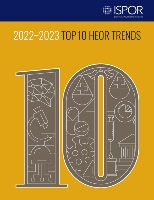
Delivering HEOR Impact in North America
ISPOR members and the HEOR community develop the field and advance HEOR excellence in North America.
Case Illustrations
Informing Changes to Medicare Drug Plan
Summary...
What Was Done?
In August of 2022, the Inflation Reduction Act was passed into law in the United States. One of the sections of this legislation includes important changes to the Medicare Part D prescription benefit design. It fixes the issues with Part D cost sharing that were highlighted by ISPOR member Jalpa Doshi, PhD and her team at the University of Pennsylvania via a series of papers that demonstrated that patient out-of-pocket costs under Part D were “too much and (occurred) too soon” in the calendar year and were associated with high rates of prescription abandonment, reductions and delays in treatment initiation; treatment interruptions; and earlier discontinuation of specialty drug treatments.
Furthermore, the 2 key provisions in this Act addressing these issues are also based on the ideas that were first proposed by Dr Doshi’s team in 2 papers published in 2016 and 2017. These include: (1) the institution of an annual out-of-pocket maximum under Part D ($2000 per year); and (2) an option for patients to spread out and pay their Part D out-of-pocket costs in monthly installments (“smoothing”), including a monthly limit.What Was the Impact?
This research provided legislators with the information needed to make evidence-based decisions when crafting this section of the legislation. These changes are going to help approximately 3.5 million Medicare beneficiaries (many of whom are on fixed incomes) and millions more in the future.
Obtaining Funding for Sustainable Dementia Care
Summary...
What Was Done?
Eric Jutkowitz, PhD (Brown University) and Laura Pizzi, PharmD, MPH (Rutgers University; currently Associate Chief Science Officer at ISPOR) worked with a team of researchers at the University of Connecticut in the United States to conduct a comprehensive cost analysis on the Care of Older Persons in their Environment (COPE) program. COPE is an evidence-based program that can help individuals living with dementia maintain and improve their quality of life and help their care partners better manage daily care challenges and reduce their own upset and distress.
What Was the Impact?
The results of this work were used to make the case to successfully obtain federal funds supporting state-wide implementation of the program through the existing care management infrastructure. This has resulted in improving the access patients requiring dementia care have to this program in Connecticut.
Evidence Shows Benefits of Home-Based Peritoneal Dialysis
Summary...
What Was Done?
The Canadian Agency for Drugs and Technologies in Health (CADTH) did a major review of the evidence comparing hospital-based hemodialysis versus home-based peritoneal dialysis. The review demonstrated that home-based dialysis is equally effective with no additional harm, is more convenient and improves the quality of life for patients, and is significantly less costly for health systems.
What Was the Impact?
Based on the evidence reported in the CADTH report, several initiatives to increase the use of home dialysis have been implemented across Canada.
Contribute Your HEOR Story of Impact
Share your story of impact with ISPOR. The Society will be sharing some of the case examples submitted to highlight the profound impact that HEOR can have on informing and improving healthcare decisions.

